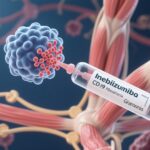Highlights
- Zongertinib, an oral HER2-selective tyrosine kinase inhibitor, achieved a 71% objective response rate in previously treated HER2-mutant NSCLC patients with tyrosine kinase domain mutations.
- Median duration of response was 14.1 months, and median progression-free survival was 12.4 months in the primary cohort.
- The safety profile was manageable, with mostly low-grade adverse events and no drug-related interstitial lung disease observed.
- Zongertinib demonstrated activity even in patients previously treated with HER2-directed antibody–drug conjugates and those with non–tyrosine kinase domain mutations.
Clinical Background and Disease Burden
Non–small-cell lung cancer (NSCLC) remains the leading cause of cancer-related mortality worldwide. Molecular stratification has transformed NSCLC management, with targeted therapies now standard for EGFR, ALK, and ROS1 alterations. Human epidermal growth factor receptor 2 (HER2) mutations, present in roughly 2–4% of NSCLC cases, represent a distinct oncogenic driver but have historically lacked effective, approved targeted treatments. HER2-mutant NSCLC tends to have a poor prognosis, and responses to chemotherapy or immunotherapy are modest. Recently, antibody–drug conjugates (ADCs) such as trastuzumab deruxtecan have shown activity, but oral small-molecule options have been limited, and optimal sequencing remains undefined. Thus, innovative oral HER2-targeted agents are a high unmet need for this subset of patients.
Research Methodology
The Beamion LUNG-1 trial was a multicohort, phase 1a–1b study assessing zongertinib, an oral, irreversible, HER2-selective tyrosine kinase inhibitor, in patients with advanced or metastatic HER2-mutant NSCLC who had received prior therapies. This analysis focuses on three predefined cohorts:
- Cohort 1: Patients with HER2 tyrosine kinase domain (TKD) mutations, previously treated with standard therapies.
- Cohort 5: Patients with HER2 TKD mutations, previously treated with HER2-directed ADCs.
- Cohort 3: Patients with non-TKD HER2 mutations.
In cohort 1, initial randomization was to zongertinib 120 mg or 240 mg daily; after interim analysis, 120 mg daily was chosen for all subsequent patients. Cohorts 5 and 3 started at 240 mg daily, but new enrollees also received 120 mg. The primary endpoint was objective response rate (ORR) assessed by blinded independent central review (cohorts 1 and 5) or investigator review (cohort 3). Key secondary endpoints were duration of response (DoR) and progression-free survival (PFS). Safety was also closely monitored.
Key Findings
In cohort 1 (n=75, HER2 TKD mutations, zongertinib 120 mg):
- Confirmed objective response rate: 71% (95% CI, 60–80), statistically significant compared to a ≤30% benchmark (P<0.001).
- Median duration of response: 14.1 months (95% CI, 6.9–not evaluable).
- Median progression-free survival: 12.4 months (95% CI, 8.2–not evaluable).
- Grade 3 or higher drug-related adverse events: 17%.
In cohort 5 (n=31, prior HER2-ADC exposure):
- Confirmed objective response rate: 48% (95% CI, 32–65).
- Grade 3 or higher drug-related adverse events: 3%.
In cohort 3 (n=20, non-TKD mutations):
- Confirmed objective response rate: 30% (95% CI, 15–52).
- Grade 3 or higher drug-related adverse events: 25%.
Across all cohorts, no drug-related interstitial lung disease was reported—a notable safety outcome given the risks seen with some HER2-targeted ADCs.
| Cohort | Population | ORR | Median DoR (months) | Median PFS (months) | Grade 3+ AE (%) |
|---|---|---|---|---|---|
| 1 | HER2 TKD, no prior ADC | 71% | 14.1 | 12.4 | 17% |
| 5 | HER2 TKD, prior ADC | 48% | n/e | n/e | 3% |
| 3 | HER2 non-TKD | 30% | n/e | n/e | 25% |
Mechanistic Insights and Biological Plausibility
Zongertinib is a highly selective irreversible inhibitor of the HER2 kinase domain, designed to effectively inhibit HER2 mutant signaling while minimizing off-target toxicity. HER2 TKD mutations, particularly exon 20 insertions, drive oncogenesis in NSCLC and are refractory to most first-generation HER2 inhibitors and standard chemotherapies. The robust efficacy of zongertinib, especially in TKD-mutant NSCLC, supports its rational design. The lack of drug-related interstitial lung disease may reflect its selectivity and oral administration route, distinguishing it favorably from HER2-directed ADCs.
Expert Commentary
Dr. John V. Heymach, the study’s lead author, stated in the NEJM publication: “Zongertinib’s high response rate and durable activity mark a significant advance for HER2-mutant NSCLC, a population with historically limited targeted options.” Current guidelines recommend clinical trial enrollment for HER2-mutant NSCLC, and zongertinib’s results will likely shift treatment algorithms if confirmed in phase 2/3 studies.
Controversies and Limitations
While the results are compelling, several limitations should be noted:
- This was a phase 1 study, with relatively small cohorts and no randomized comparator arm.
- Follow-up duration, especially for non-TKD and ADC-pretreated cohorts, remains limited.
- Long-term safety data, particularly regarding rare toxicities, are still maturing.
- Generalizability to diverse global populations and real-world practice awaits further validation.
Conclusion
Zongertinib represents a highly promising oral targeted therapy for patients with previously treated HER2-mutant NSCLC, demonstrating high response rates, durable benefit, and a favorable safety profile. These results address a major unmet need and support further development in larger, controlled studies. Questions remain about optimal sequencing relative to HER2-directed ADCs and the role of zongertinib in earlier lines of therapy. Nevertheless, this trial establishes a new benchmark for oral HER2 inhibition in lung cancer.
References
Heymach JV, Ruiter G, Ahn MJ, Girard N, Smit EF, Planchard D, Wu YL, Cho BC, Yamamoto N, Sabari JK, Zhao Y, Tu HY, Yoh K, Nadal E, Sadrolhefazi B, Rohrbacher M, von Wangenheim U, Eigenbrod-Giese S, Zugazagoitia J; Beamion LUNG-1 Investigators. Zongertinib in Previously Treated HER2-Mutant Non-Small-Cell Lung Cancer. N Engl J Med. 2025 Jun 19;392(23):2321-2333. doi: 10.1056/NEJMoa2503704.



